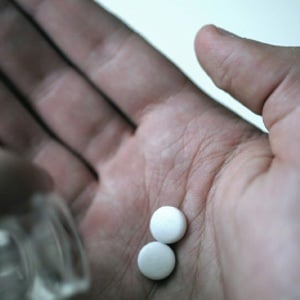
iStock
The exact causes of depression are not known, but research shows that many possible causes include both biological/physical and social/psychological factors.
Roughly 80-90% of depressed people respond well to treatment and most of those who are appropriately treated will experience some relief from symptoms.
Treatment with antidepressants
All antidepressants are considered equally effective, provided an adequate dosage is taken over a sufficient period. Different drugs are often prescribed for different people, depending on the symptoms presented, and each type comes with its own side-effects.
The speed at which antidepressants work can vary and it may take some time for the correct dosage to be determined and reached before they become visibly effective. This can take between six to eight weeks.
Read: Overall benefit from antidepressants
Different types of antidepressants
The commonly prescribed antidepressants are known as “reuptake inhibitors”. These medications block the process in which neurotransmitters are naturally absorbed back into nerve cells in the brain.
The reason for this is to keep the neurotransmitter levels higher to improve communication between the nerve cells which in turn strengthens the mood-regulating circuits in the brain.
There are three main types:
Selective Serotonin Reuptake Inhibitors (SSRI’s)
These act on the neurotransmitter (brain chemical) serotonin. This group of drugs is the most commonly prescribed due to their more positive side-effect profile and relative safety if taken in overdose.
There may be side effects for a few weeks but they often disappear. Common side-effects include:
• Nausea – (take after food)
• Headache – (improves after a while; start with low dosages)
• Agitation/anxiety
• Sleep disturbances
• Decreased appetite
• Sexual disturbances
Serotonin and Noradrenaline Reuptake Inhibitors (SNRI’s)
This class of medications is closely related to the SSRI’s, but have an additional mechanism of action in that they also affect noradrenaline reuptake and have been shown to be effective in preventing relapse episodes of depression. They are often used when the depression is accompanied by painful physical symptoms such as headaches and muscle pain.
Norepinephrine and dopamine reuptake inhibitors (NDRIs)
These affect the reuptake of norepinephrine and dopamine. NDRIs halt the re-absorption of the neurotransmitters norepinephrine and dopamine in the brain. This increases the effectiveness of the neurotransmitters which causes a positive effect on moods.
Read: Are antidepressants overused?
Guidelines on antidepressants
It can take up to a month for the benefits of an antidepressant to be felt, but it is important that the medication be continued at the correct dosage for the specified time.
While antidepressants are not addictive, if you decide to stop taking them without the supervision of your doctor, you may experience withdrawal symptoms. These medications should only be taken under the supervision of a physician.
Read more:
Why antidepressants work better for some
Antidepressants may increase diabetes risk
Suicide risk for all antidepros
Roughly 80-90% of depressed people respond well to treatment and most of those who are appropriately treated will experience some relief from symptoms.
Treatment with antidepressants
All antidepressants are considered equally effective, provided an adequate dosage is taken over a sufficient period. Different drugs are often prescribed for different people, depending on the symptoms presented, and each type comes with its own side-effects.
The speed at which antidepressants work can vary and it may take some time for the correct dosage to be determined and reached before they become visibly effective. This can take between six to eight weeks.
Read: Overall benefit from antidepressants
Different types of antidepressants
The commonly prescribed antidepressants are known as “reuptake inhibitors”. These medications block the process in which neurotransmitters are naturally absorbed back into nerve cells in the brain.
The reason for this is to keep the neurotransmitter levels higher to improve communication between the nerve cells which in turn strengthens the mood-regulating circuits in the brain.
There are three main types:
Selective Serotonin Reuptake Inhibitors (SSRI’s)
These act on the neurotransmitter (brain chemical) serotonin. This group of drugs is the most commonly prescribed due to their more positive side-effect profile and relative safety if taken in overdose.
There may be side effects for a few weeks but they often disappear. Common side-effects include:
• Nausea – (take after food)
• Headache – (improves after a while; start with low dosages)
• Agitation/anxiety
• Sleep disturbances
• Decreased appetite
• Sexual disturbances
Serotonin and Noradrenaline Reuptake Inhibitors (SNRI’s)
This class of medications is closely related to the SSRI’s, but have an additional mechanism of action in that they also affect noradrenaline reuptake and have been shown to be effective in preventing relapse episodes of depression. They are often used when the depression is accompanied by painful physical symptoms such as headaches and muscle pain.
Norepinephrine and dopamine reuptake inhibitors (NDRIs)
These affect the reuptake of norepinephrine and dopamine. NDRIs halt the re-absorption of the neurotransmitters norepinephrine and dopamine in the brain. This increases the effectiveness of the neurotransmitters which causes a positive effect on moods.
Read: Are antidepressants overused?
Guidelines on antidepressants
It can take up to a month for the benefits of an antidepressant to be felt, but it is important that the medication be continued at the correct dosage for the specified time.
While antidepressants are not addictive, if you decide to stop taking them without the supervision of your doctor, you may experience withdrawal symptoms. These medications should only be taken under the supervision of a physician.
Read more:
Why antidepressants work better for some
Antidepressants may increase diabetes risk
Suicide risk for all antidepros




 Publications
Publications
 Partners
Partners










